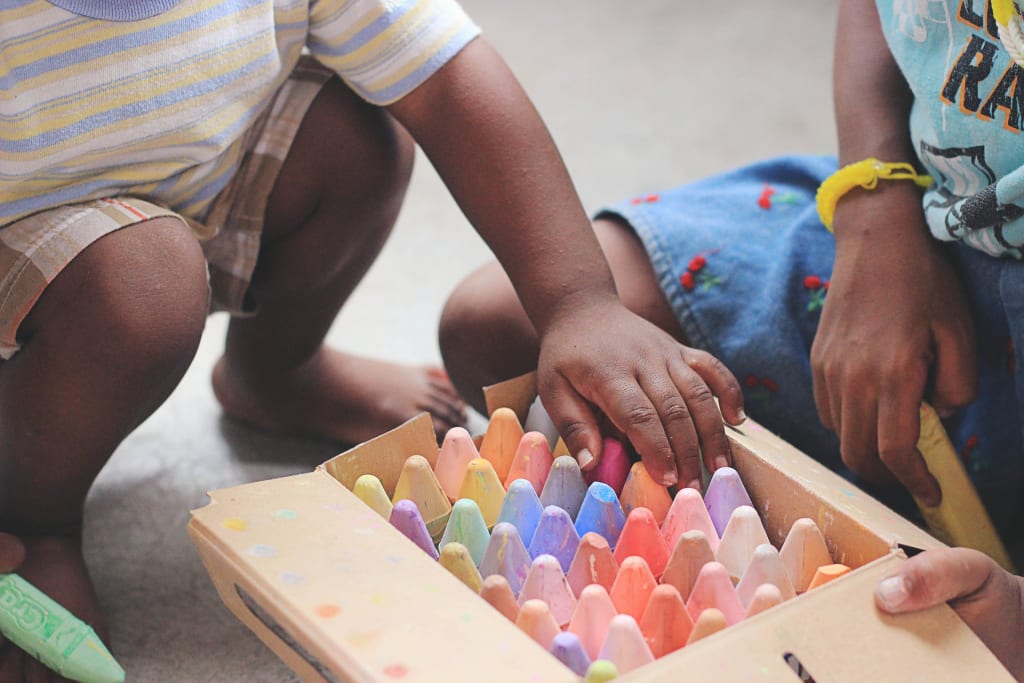Colored
The meaning of one word in a white world

I was maybe 19 when it happened. Oh, and the young, African-American woman was so angry she briskly walked away, saying nothing. I really didn't know what I had done, but a kind friend enlightened me: "colored" was an ethnic slur. Colored had such a different meaning to me before this point. Don't give up on me; keep reading.
Growing up I didn't get to see many African Americans. As a college freshman, I had befriended some people in the theater circles in Oklahoma City. On this particular day, we ended up in the charming town of Guthrie, the territorial capital and original capital of Oklahoma. Red-bricked, Late Victorian buildings lined the main streets; the building we entered, the Pollard Theater, boasted era-appropriate curvy-topped windows on the second floor. The Pollard Theatre Company was formed as a partnership with nearby Langston University just two or three years beforehand. And Langston University was the first African American institution of higher education in the territory/state. To give some perspective to the setting of the above incident, around 90 years before this partnership, Langston University was created as a "Colored Agricultural and Normal University" because the territorial governor had vetoed a civil rights bill that would have disregarded segregation. They didn't teach you that part of history in school. All I knew was Langston University was a black college.
As I've stated, while growing up in Oklahoma, I didn't get to see or interact with many African Americans. The kind of racial variety I saw was mostly Hispanic and Native American. Mainly because my mother's family is Hispanic. My father was German-American and came from a long line of wheat farmers. My mother mostly passed as white. Our whole family passed as white. I didn't always feel very white but was accepted as white. I grew up in Oklahoma in the 70s and 80s. There were Black Towns. African-American communities were in larger cities like Tulsa and Oklahoma City —and only in specific areas. This was another reason I rarely saw anything other than German- and Czech-Americans. Blue eyes and blonde hair. Neither of which applied to me. The only time there was color in my life was when we'd visit mis abuelitos (grandparents) and my aunts, uncles, and cousins on my mom's side in California. Aside from these visits to the west coast, my world was a white world. I didn't know it, but it was privileged, too. When you can pass as white, you get treated as white. I savored time with my mama's family, savored the dark eyes and dark hair and sometimes dark skin. Dark-eyed, dark-haired happy family was color for me.
The first time I befriended an African-American was in 6th grade. She was a young teen that lived in the neighborhood where we were renting until our house was built. It was hard not to stare at her; she was beautiful. I was such a skinny, awkward, mouth-full-of-metal, poofy-headed 11-year-old tomboy. She was curvy and had smooth, chocolatey skin, and an unbelievable smile. Plus, she was especially nice to me despite my appearance. This was color for me; beautiful and sweet.
In 7th grade, I remember an African-American boy coming to our school. A school in which, aside from one Native-American girl in our school who had dark eyes, hair and skin, most distinctly looking nothing like all of the rest of the students in our small, country school that spanned from kindergarten through high school, everyone passed as white. The African-American boy was tall and lanky and could run fast. I could tell that others didn't accept him. And before I could blink my eyes, he was gone. Nobody told us why. Something deep down inside told me it was because no one accepted him and no one had ever accepted him. This was the first time that color meant alienation to me. I couldn't wrap my head around it. How did others see color?
I can only recall two times when race tinted life in an unfavorable shade for me personally. Both were odd experiences; experiences that I just couldn't grasp fully. When I was in third grade, a boy referred to me in some way as Indian (not Native American, but Indian). I don't recall what he said. All I know is the teacher was very displeased. I knew I wasn't Indian, so my reaction was "Huh? What are you talking about?" And, then, it was over. The next time was in college. I usually went dancing with a guy friend, but he wasn't around. I went to our usual dance joint and the music was pumping. It was always a mix of people —black, white, Hispanic– a good mix. I danced a few fast-beat dances with an African-American boy. He could really move his body and I was having fun. As the evening wound down, he asked for my phone number. I said no; I had a boyfriend. He replied, "You're just saying that because I'm black." Of course, I knew he was black, but it hadn't occurred to me that he might think I would make a decision based on the color of his skin. I wanted to be offended, "He doesn't know me." I didn't let it bother me that night, but it stuck with me. I didn't understand his world. I sincerely didn't understand what it was like to be judged over and over again based on the color of skin. I walked away that night clueless. Not understanding color.
I had no idea that the term, "colored" hailed from the Jim Crow era of United States segregationist history. I'm not sure I can fault my parents or myself for this oversight. They believed it was enough to raise kids that saw all people as equals. What they didn't know is that there was so much of the past laced in and out of the present. Vocabulary like "nigger knocking" and "nigger toes" (Brazil nuts) and "colored" that I heard people outside our family use. I knew not to say "Nigger." But the words themselves aren't just words; they point to an undercurrent of racial bias that simmered just below the surface of society. For me, it was the lack of understanding, the depth of understanding of what it is to be black in the United States. I knew about slavery. They taught you that part of history in school. I knew it was not okay to be prejudice and judge others on their appearance. My parents taught me that. I knew that all peoples were created equal. But this wasn't enough.
50 years on this earth, and I am still learning and exploring what it is to be a person of color in the United States and to appreciate the challenges that they might face. I can say that I am not prejudiced, that I have no problem with black, yellow, caramel...color, but it's not about that. For me it's about ignorance. My parents never never never taught me a vocabulary or attitudes which might be defined as racist. But I was also never taught what it was like to be Black American. I had to learn on my own. I had to learn that part of the equation was the compounding generations of prejudice and repeated prejudice within one individual life, that leads a person of color to always hear the majority-white world speaking and acting against them. Struggling all the time to be treated with equality and to "pull yourself up" by bootstraps that were once your great-grandparents' shackles. Or deal with the reality that your mother and father were barred from getting a college education. My own father came from a poor white farming family and he had the opportunity, the privilege to work hard and put himself through college. Black Americans have to carry a great deal more than I; their shoulders yoked with centuries of oppression, indifference, and lack of knowledge or understanding. It's NOT just blatant actions of racism or prejudice, but also these subtle layers which add insult to injury to injury to injury. And to exacerbate the situation, an ignorant 19-year-old uses an ethnic slur like "colored" not knowing that this one word meant much, much more than the color of skin. If only I could go back in time and say I'm sorry to that young woman. I cannot. All I can do is to explore and remain open to understanding others and be a voice for those who need help being heard.
About the Creator
Maria Lara Dailey
Writing for the love of a well-told story.
Enjoyed the story? Support the Creator.
Subscribe for free to receive all their stories in your feed. You could also pledge your support or give them a one-off tip, letting them know you appreciate their work.






Comments
There are no comments for this story
Be the first to respond and start the conversation.